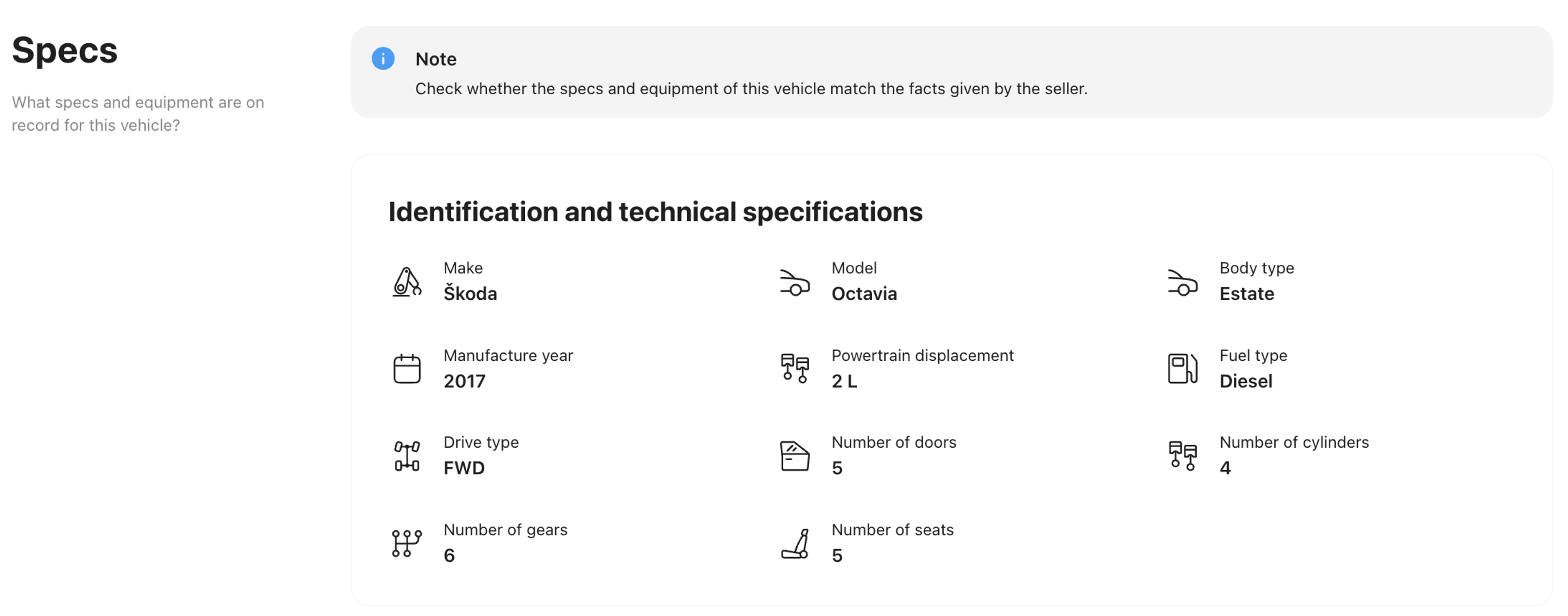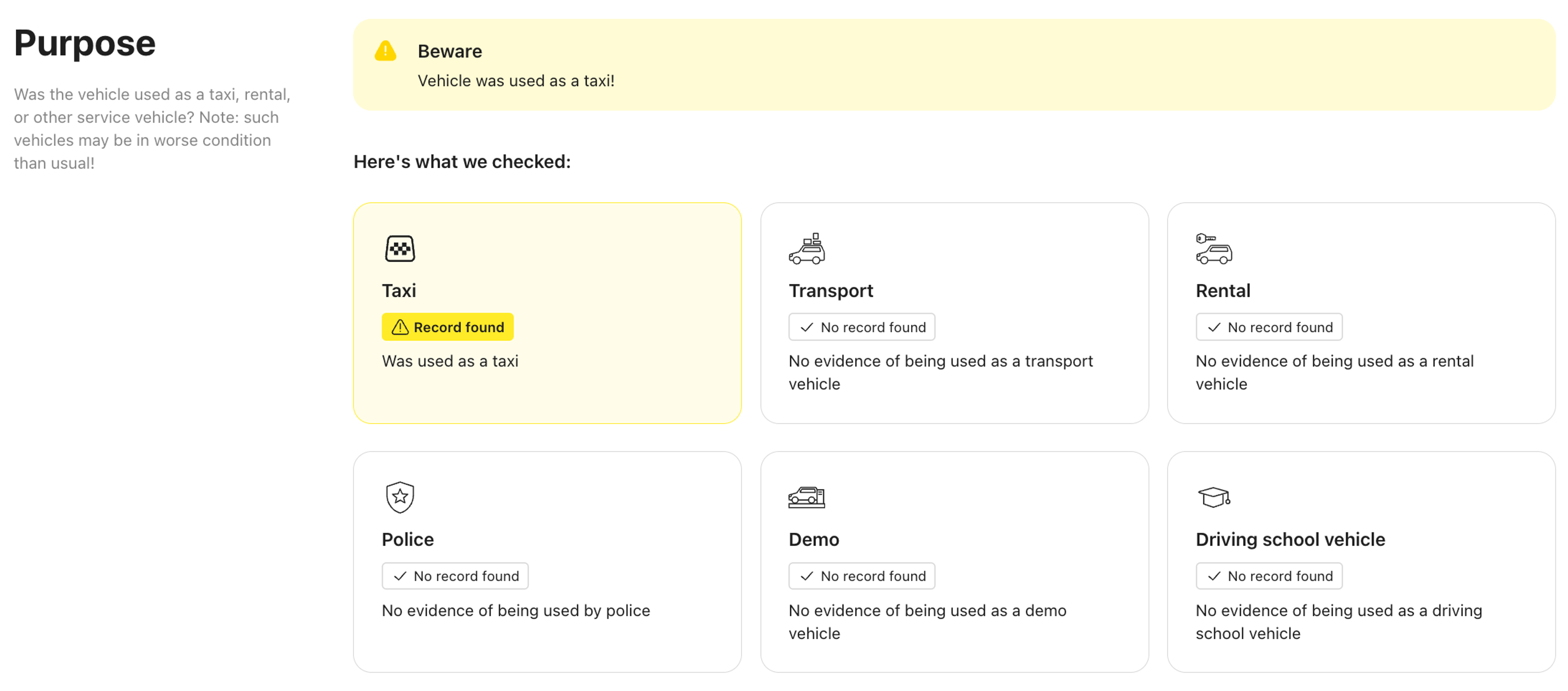25/11/2024
How carVertical can help you learn the value of a used car

Karolis Bareckas

It can be tricky to evaluate if the vehicle you’re interested in is worth the asking price. The same model can be priced very differently and it may take extensive research to understand why.
For those of us who are not experts, getting a good deal on the used car market is all about learning the thought process and finding the facts. This is where carVertical’s history report comes to the rescue.
In this article, we’ll go over the things to consider when investigating a car, and how our history reports can help.

Used cars have dark secrets
Reveal them all! Just enter a VIN code and click the button:
1. Learning the price range and how our Market Value feature can help
Once you’ve set your eyes on a particular car model, it’s time to start researching. Check online marketplaces and classifieds websites to get an idea of its price range. Remember:
- Look at cars of a similar age, mileage, equipment, and condition. The model is not everything – two cars of the same model can have widely-varying prices on the market.
- Consider the seller type – cars sold by dealerships are typically more expensive.
An easy way to learn how the model you’re interested in is priced is by getting the carVertical history report and heading to the Market value section. This will provide you with an estimated price of similar models, including the lowest and the highest price.

If the car is priced significantly lower than the average price, this should raise your suspicion – perhaps it’s fine, or it may have hidden defects. Scammers often reduce the price to make a quick sale with less research on the end of the buyer. We strongly advise against making spontaneous decisions when buying a car.
Take time to familiarize yourself with information on the vehicle history report and don’t hesitate to ask the seller as many questions as you need.
2. Evaluate the car’s condition – our report can help
Mileage, damages, equipment and technical specifications, and the overall condition are the most important factors contributing to a used car’s price. Therefore, evaluating the car’s history and condition is a crucial step towards getting a good deal.
Not all sellers are sincere, and even those who are sincere may have overvalued their car. Luckily, you can always negotiate the asking price and save money.
Mileage section: Vehicles with odometer fraud may cost up to 25% more than they’re worth

Mileage rollbacks can significantly reduce the actual value of a used car and often lead to unexpected expenses for the buyer. Needless to say, a car with 200,000 km on the odometer is worth less than one with 100,000 km. In fact, based on our research, a car with falsified mileage may be overpriced by as much as 25%.
If you notice a mileage discrepancy in the history report, it’s a clear sign that the car’s value is likely lower than the asking price. Keep in mind, however, that the current owner may not necessarily be responsible for the rollback, as it could have happened before they purchased the vehicle.
Aside from making cars overpriced, mileage rollbacks also create uncertainty around maintenance. For example, a wrong odometer reading can make it difficult to know when important maintenance tasks, like changing the timing belt, should be performed. This can result in costly repairs that can be avoided with proper maintenance records based on mileage.
Damage section: Severe damage drives the car’s price down

A history report provides detailed information about a car's past damages and estimated repair costs, allowing you to see exactly what kind of damage the vehicle has endured.
When meeting with the seller, you may want to ask about the damages you’ve seen on the report, including the documentation on how the car was repaired. Without this, you risk buying a car that may have been severely damaged and fixed with cheap parts, which can compromise its reliability and safety.
Significant damage impacts a car's value considerably, so the more incidents it has had, the lower its price should be. If you’re going to buy such a car, make sure it’s checked by a mechanic to assess the quality of repairs and confirm if any potential issues remain.
In some cases, prior damage can result in hidden safety concerns. Even if the car is priced attractively, it may require extensive future repairs.
Check the Specs and Equipment sections to fill in the blanks

In the history report, you can review the vehicle's specs, and some reports may have a more extensive equipment list you can compare to the seller’s information. This comparison allows you to confirm that the car's features match what was advertised. You can also compare the model you’re interested in with similar models to see if it has fewer features or lower equipment levels, which could mean the car is worth less than the asking price.
Purpose section: Former taxis and rentals are worth less

If a car was previously used as a taxi, rental, or other service vehicle, its condition may be worse than it appears. These vehicles often have high mileage, and the interior may show significant wear. Cars that spent their whole lifespan roaming in cities are also more likely to have experienced frequent minor accidents, such as scratches and dents, so it’s important to carefully inspect the bodywork to ensure any repairs and repainting were done properly.
Since taxis and rental vehicles typically undergo more stress and wear than regular passenger cars, their resale value should generally be lower. If you’re considering buying such a vehicle, be sure to negotiate a fair price that reflects the additional wear and possible maintenance needs.
Explore other parts of the carVertical report
When evaluating the price of a used car, it’s helpful to directly head to the Market value section in the report, but be sure to explore the other sections, too.
Each part of the history report provides valuable insights into the car’s past, so it’s important to explore historical photos, financial restrictions, taxes, safety recalls, emissions, and other sections. This comprehensive view helps you calculate potential maintenance costs and assess the car’s overall worth.
A car is a complex machine that may have had multiple owners and encountered various legal events throughout its lifespan. Before committing to a purchase, understanding these details is essential. With a full carVertical history report, you can accurately determine the car's real value and decide if it’s truly worth the asking price.

Check your registration number
Avoid costly problems by checking a vehicle's history. Get a report instantly!
3. What should be the real value of the car?
When you know how similar models are priced in the market and learn the history of the car you’re interested in, you can better understand the real value of the vehicle. If the car has mileage discrepancies and suffered severe damage, you can easily negotiate a better price with the seller.
Use the vehicle history report as a bargaining chip, address all the flaws of the car, and you can expect the seller to lower the price.
The value of the car depends not only on its condition but also on the current market situation and overall economic environment in the country. This means that the value of the car may fluctuate. However, when you understand what to look for in the vehicle, you can avoid overpaying for a car and make more informed decisions.
Frequently asked questions

Article by
Karolis Bareckas
Karolis is an automotive writer focusing on the industry part of things. His goal is to educate readers and foster transparency in the used car market. With a passion for storytelling and extensive experience writing in a variety of fields, Karolis enjoys sharing his knowledge and spreading the word about automotive and tech topics. He’s also a a big fan of muscle cars and long road trips.
